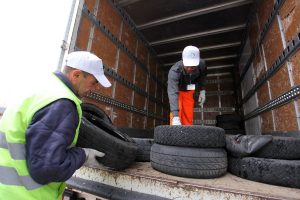 Ecopneus will extraordinarily collect a further 11,000 tonnes of End-of-Life Tyres beyond its legal target during this last term of 2018. This amount is to be added to the over 3,000 “extra” tonnes of ELTs already collected between August and September.
Ecopneus will extraordinarily collect a further 11,000 tonnes of End-of-Life Tyres beyond its legal target during this last term of 2018. This amount is to be added to the over 3,000 “extra” tonnes of ELTs already collected between August and September.
The extra resources needed for this intervention have been made available thanks to the following: the positive trend of sales recorded by the Ecopneus’ shareholders in the last weeks; the positive sales prospects for the last term of the year; and management efficiency that has allowed to keep costs under control and, in some cases, even to reduce them.
This decision is the result of the acknowledgement of the real difficulties that many service points have (tyre dealers, service stations, workshops). Many of them have excess stock of End-of-Life Tyres compared to their storage capacity. This decision has been taken despite the current impasse in the phase of recovery following treatment. In this moment, material recycling has, indeed, slowed down due to a sentence of the Council of State. This has brought uncertainty in the industrial chain, due to the concrete risk that recycled rubber powders and granules may not even be recognised the status of Secondary Raw Materials (SRM) anymore. On the contrary, they would be brought back to the state of waste, with subsequent obvious problems in their placement on the market. Moreover, the delays and uncertainties about the publication of the “End of Waste” Decree do not allow the placement of granules and powders on many application sectors currently waiting for this measure. Indeed, the “End of Waste” Decree would definitively and uncontrovertibly award the status of material to granules and powders derived from recycling at national level.
The End-of-Life Tyres collected with this extraordinary intervention will be largely sent to energy recovery abroad – a destination that can quickly absorb large quantities on top of the regular flow planned during the course of the year. The very favourable costs of this recovery option allow to be able to handle a higher quantity of ELTs compared to what would have been possible to manage with material recovery with the same financial resources. Since the beginning of its activities, Ecopneus has chosen to prioritise the material recovery of ELTs. This is in line with European trends and the principles of the circular economy. It is also the only solution that can appropriately valorise the chemical-physical characteristics of recycled rubber. Even though it is not a priority in the green strategy of Ecopneus, today the option of energy recovery becomes almost an obligatory solution, in a situation of criticality of downstream markets for material recycling. The energy recovery of ELTs is mainly carried out in cement factories, as they allow to maximally exploit the high calorific value of rubber, which is higher than pet coke. Moreover, it does not generate any further emissions (actually, it improves the pre-existing ones) and allows to recover combustion residues, ashes, and steel as materials, which are then incorporated into the final product (cement), with an environmental and economic benefit.

 Collect ELT
Collect ELT